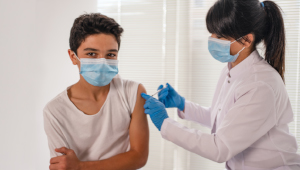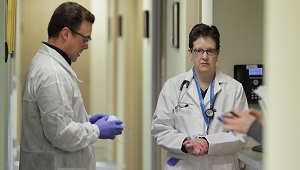Lisa A. Jackson, MD, MPH
Biography
Lisa A. Jackson, MD, MPH, is an internist and infectious disease epidemiologist who has conducted clinical and epidemiologic studies of vaccine safety and efficacy since 1991.
Dr. Jackson is the principal investigator (PI) of KPWHRI’s Vaccine and Treatment Evaluation Unit — one of 10 network sites that the National Institutes of Health (NIH) sponsors. In this role, she leads the phase 1 clinical trial of the COVID-19 vaccine co-developed by Moderna and NIH. Launched in March 2020, this trial was the first in the world to begin testing a COVID-19 vaccine. She is also leading the phase 3 clinical trials of the COVID-19 vaccines developed by Moderna and NIH and by Janssen Pharmaceutical Companies, part of Johnson & Johnson, at KPWHRI.
Additionally, Dr. Jackson serves as KPWHRI’s principal investigator in the Vaccine Safety Datalink Project (VSDP). Sponsored by the Centers for Disease Control and Prevention (CDC), VSDP conducts ongoing research on the safety of licensed vaccines in routine use.
Dr. Jackson has written more than 200 peer-reviewed publications and 14 book chapters. She is a past member of the Food and Drug Administration’s Vaccines and Related Biological Products Advisory Committee and the National Vaccine Program Office’s National Vaccine Advisory Committee.
After receiving her medical degree from the University of Virginia School of Medicine, in Charlottesville, Dr. Jackson earned her Master of Public Health (MPH) degree at the University of Washington (UW) School of Public Health. She completed her internal medicine residency training at the UW School of Medicine and served as an epidemic intelligence officer and preventive medicine resident at the CDC.
Research interests and experience
Vaccines & Infectious Diseases
Vaccine safety; COVID-19 vaccine safety and effectiveness; influenza vaccine effectiveness in the elderly; methodologic issues in vaccine effectiveness evaluations; pneumococcal polysaccharide vaccine effectiveness; pneumococcal conjugate vaccine immunogenicity in the elderly; epidemiology of E. coli bacteremia; epidemiology of community-acquired pneumonia
Recent publications
Jackson LA, Cherry JD, Wang SP, Grayston JT. Frequency of serological evidence of bordetella infections and mixed infections with other respiratory pathogens in university students with cough illnesses. Clin Infect Dis. 2000;31(1):3-6. PubMed
Jackson LA. Description and status of the azithromycin and coronary events study (ACES). J Infect Dis. 2000;181 Suppl (3):S579-81. PubMed
Jackson LA, Campbell LA, Schmidt RA, Kuo C, Cappuccio AL, Lee MJ, Grayston JT. Specificity of detection of Chlamydia pneumoniae in cardiovascular atheroma. J Infect Dis. 2000;181 Suppl (3):S447-8. PubMed
Jackson LA, Smith NL, Heckbert SR, Grayston JT, Siscovick DS, Psaty BM. Past use of erythromycin, tetracycline, or doxycycline is not associated with risk of first myocardial infarction. J Infect Dis. 2000;181 Suppl (3):S563-5. PubMed
Rosen H, Muhlestein JB, Bartlett J, Chen S, Chikami G, Corson M, Shah PK, Gurfinkel E, Handsfield H, Jackson L, Knirsch C, Kronmal R, McCutchan JA, Shea S. Collaborative multidisciplinary workshop report: clinical antimicrobial trials for primary and secondary prevention of atherosclerotic cardiovascular disease. J Infect Dis. 2000;181 Suppl (3):S582-4. PubMed
Vincent JM, Cherry JD, Nauschuetz WF, Lipton A, Ono CM, Costello CN, Sakaguchi LK, Hsue G, Jackson LA, Tachdjian R, Cotter PA, Gornbein JA. Prolonged afebrile nonproductive cough illnesses in American soldiers in Korea: a serological search for causation. Clin Infect Dis. 2000;30(3):534-9. PubMed
Chen RT, DeStefano F, Davis RL, Jackson LA, Thompson RS, Mullooly JP, Black SB, Shinefield HR, Vadheim CM, Ward JI, Marcy SM. The Vaccine Safety Datalink: immunization research in health maintenance organizations in the USA. Bull World Health Organ. 2000;78(2):186-94. PubMed
Jackson LA. Trench fever. In: Strickland GT, ed. Hunter’s Tropical Medicine, 8th ed. Philadelphia: W.B. Saunders Company, 2000:442-3. PubMed
Jackson LA, Grayston JT. Chlamydia pneumoniae. In: Mandell GL, Bennett JE, Dolin R, eds. Principles and Practice of Infectious Diseases, 5th edition, 2000:2007-2014. PubMed
Starr JR, Jackson LA. Chlamydia pneumoniae and atherosclerotic cardiovascular disease. Clin Microbiol Newsletter. 2000;21:145-148. PubMed
News

Vaccine program recruiting volunteers in Seattle area
KPWHRI’s vaccine registry was the first to enroll participants in a clinical trial of a COVID-19 vaccine.
News

Clinical trial will evaluate mpox vaccine for adolescents
The NIH-sponsored trial will help inform decisions about vaccine approval for 12- to 17-year-olds.
Research

New study confirms safety of shingles vaccine
KPWHRI researchers analyzed data from more than 640,000 vaccine doses to understand risk of severe reactions.
Research

‘Fighting back’ against COVID-19: Remembering a historic trial
Lisa Jackson, MD, MPH, Kaiser Permanente Washington senior investigator, recounts the genesis of a groundbreaking vaccine.



